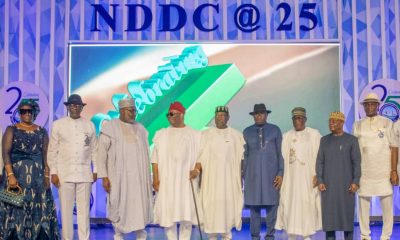NATIONAL NEWS
Tinubu Spending Fuel Subsidy Savings On Road Infrastructure Nationwide, Says TMSG

The Tinubu Media Support Group (TMSG) has stated that the massive number of ongoing road projects in nearly two years is a significant indicator of where President Bola Tinubu’s administration has invested the majority of the funds saved from the removal of fuel subsidies.
This, according to the group, is a fulfilment of the President’s assurances following his bold move upon taking office in May 2023.
In a statement signed by Chairman Emeka Nwankpa and Secretary Dapo Okubanjo, TMSG stated that the N5 trillion annual savings from the removal of fuel subsidies are being used to construct or rehabilitate several roads across the country.
” It is documented that the Bola Tinubu administration inherited approximately 2,600 road projects, with several of them in various stages of completion as a result of the previous ex-President Muhammadu Buhari administration.
“We, however, understand that funding has always been an issue, which is why Nigeria saw the introduction of the Tax Credit Scheme, which allows corporations to repair or build roads instead of paying taxes, as part of efforts to bridge the funding gap for infrastructure development and renewal.
“But with the removal of fuel subsidies, which has freed up funds worth over N5 trillion per year that were previously used to import cheaper fuel, we dare say that the federal government now has more funds to channel into over 2,000 road projects across the country.
“From 2005 to 2022, Nigeria spent an estimated $75 billion on fuel subsidies. This translates to an average annual spending of $5 billion, which exceeds the annual expenditure in several sectors combined.
However, with the removal of petroleum subsidies, the pump price of fuel increased from N200 to N1000 per litre, much to the chagrin of many Nigerians. Conversely, the federal government and subnationals now
have more money to spend on infrastructure and other programmes that could boost productivity.
“So, not surprisingly, the Tinubu administration chose to invest a portion of what could have been used to pay for fuel subsidies in road infrastructure, going so far as to embark on multiple construction and rehabilitation projects, as opposed to the usual practice of a few projects at a time, which Nigerians were accustomed to.
“In recent months, the Tinubu administration has undertaken some ambitious, legacy road projects, including
The Lagos-Calabar Coastal Highway, the Sokoto-Badagry Superhighway, and the Abakaliki-Abuja Highway are currently being upgraded, as are the Akwanga-Jos-Bauchi-Gombe Highway and the Abuja-Kano Motorway, among others.
“Similarly, there are at least 260 ongoing emergency repair interventions, 162 in the north and 98 in the south.
“And for those who claim that projects are skewed against one region of the country, a fact sheet from the works ministry shows that out of the 2,735 kilometres covered by the Renewed Hope Legacy Projects, 1,414 kilometres (52%) are in the North, while 1,321 kilometres (48%) are in the South.
“We are also aware that in a few days, some of the roads undergoing emergency repairs will be commissioned to commemorate President Tinubu’s second year in office.”
TMSG also expressed hope that by the President’s third anniversary, several sections of the legacy roads would be complete and ready for use by Nigerians.
-
CRIME3 years ago
PSC Dismisses DCP Abba Kyari, To Be Prosecuted Over Alleged $1.1m Fraud
-
FEATURED4 years ago
2022 Will Brighten Possibility Of Osinbajo Presidency, Says TPP
-
FEATURED2 years ago
Buhari’s Ministers, CEOs Should Be Held Accountable Along With Emefiele, Says Timi Frank
-
BUSINESS & ECONOMY2 years ago
Oyedemi Reigns As 2023’s Real Estate Humanitarian Of The Year
-
SPORTS2 years ago
BREAKING: Jürgen Klopp Quits Liverpool As Manager At End Of Season
-
SPORTS2 years ago
Could Liverpool Afford Kylian Mbappe For €200 million? Wages, Transfer Fee
-
ENTERTAINMENT2 years ago
Veteran Nigerian Musician, Basil Akalonu Dies At 72
-
FEATURED2 years ago
Tribunal Judgement: Peter Obi Warns Of Vanishing Electoral Jurisprudence, Heads To Supreme Court
-
BUSINESS & ECONOMY2 years ago
Oyedemi Bags ‘Next Bulls Award’ As BusinessDay Celebrates Top 25 CEOs/ Business Leaders
-
FEATURED3 years ago
2023 Presidency: South East PDP Aspirants Unite, Demand Party Ticket For Zone



































